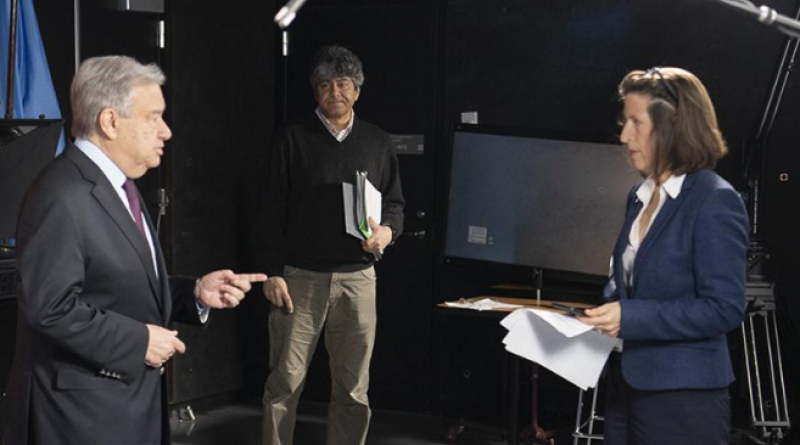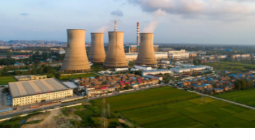Chance for extractive industries to support an inclusive and sustainable recovery

UN Secretary-General calls for sea-change in extractive industries as crucial ingredient in COVID-19 recovery, addressing inequalities and climate action
New York, 25 May 2021—United Nations Secretary-General António Guterres will convene leaders and ministers from 18 countries that heavily rely on extractive industries in a roundtable discussion today.
The leaders’ meeting comes as the world continues to suffer from the grave social, environmental, and economic impacts of COVID-19. On the table are options for transforming the sector to support sustainable development and a just transition to the green economy.
“This sector can avoid exacerbating inequalities by ensuring the fair distribution of the benefits of the development of extractive industries, in line with the right to development,” said United Nations Secretary-General António Guterres. “We need to improve extractive resource governance through more effective rules and enforcement related to environmental sustainability, transparency, inclusive decision-making, accountability, access to information and respecting and protecting human rights.”
Many developing countries that depend on extractive industries are facing severe fiscal deficits due to COVID-19 and have rolled back social and environmental safeguards to attract investments and boost their economies in the short-term.
Often these countries are rich in the commodities needed for the renewables revolution and clean technologies, including lithium, graphite, manganese, cobalt, and critical raw materials, providing a window of opportunity to capitalize on this rising demand.
The production of some of those minerals could increase by nearly 500 percent by 2050 as clean energy technologies use increase, while the carbon footprint associated with their production will account for 6% of emissions generated by fossil fuels.
Alignment of the sector with sustainable and circular practices is a necessity.
Presently, mineral resource extraction plays a dominant role in the economies of 81 countries that account for a quarter of global GDP. Yet these countries are also home to half of the world’s population and nearly 70 percent of those living in extreme poverty—a glaring sign that extractive industries are not contributing to poverty reduction or the SDGs. Governance and revenue mismanagement, corruption, and illicit financial flows continue to undermine these collective efforts.
The over-dependence of many economies on extractives has brought new awareness about the need for greater diversification and redistribution of revenue to enhance inclusion and resilience.
It is also necessary that vulnerable communities and segments of the population such as women, indigenous peoples, and youth, are adequately supported to benefit from the sector and have access to reskilling when necessary to ensure a successful energy transition.
The Roundtable will look at how countries, the private sector, civil society, and other stakeholders can come together to address a range of issues in the extractives sector that affect economic and social development and the protection of the environment.
New United Nations policy brief on transforming extractive industries
In a new policy brief issued today, “Transforming Extractive Industries for Sustainable Development”, the Secretary-General noted that the abundance of raw materials has often, counterintuitively, locked many developing countries into patterns that serve as a barrier to long-term economic development.
“Extractive industries,” he said, “have immense potential to drive growth, support sustainable development, and reduce poverty in developing countries. Yet, the actual contribution of extractive industries to sustainable development in countries rich in raw materials has often been mired by financial, economic, governance, social and environmental concerns, leading to the so-called resource curse or paradox of plenty.”
A shift in mindset is needed
A shift in mindset is needed away from short-term economic considerations to long-term financial risks and broader-based benefits associated with a just transition to a net-zero future, that accounts for social, environmental and cultural externalities.
Member States are invited to establish a Working Group on Extractive Industries to lead international efforts to transform extractive industries to support sustainable development and to implement the outcomes of this Initiative at the country-level.
The policy brief lays out 18 recommendations over six areas that include financing for development; governance and revenue management; the green economy; a just transition to sustainable systems; technology, innovation, and a circular economy; and regional and global collaboration.
Financing for Development
- Offer debt suspensions for commodity-dependent countries.
- Establish a long-term debt swap mechanism for debt-for-climate/nature swaps.
- Channel Special Drawing Rights (SDRs) to commodity-dependent countries to provide liquidity to transform extractive industries.
- Bolster direct taxation of income and property to enhance fiscal resilience in the sector.
Governance and revenue management
- Harmonize national standards and further enforce clear regulatory frameworks to ensure oversight of all companies.
- Strengthen anti-corruption laws and law enforcement.
- End tax havens as conduits for illicit financial flows in the extractives sector.
The Green Economy
- Create a common ESG taxonomy and principles to increase ESG financing.
- De-risk sustainable investments through enhanced coordination between the private sector, multilateral development banks and governments.
- Create tax incentives to encourage sustainable practices in the extractives sector.
A just transition to sustainable systems
- Invest rents from extractives in sustainable development of local populations.
- Establish clear national visions, strategies, and industrial policies to support a just energy transition and attain a circular economy.
- Systematically include civil society, women, indigenous peoples, local communities, and those affected by the green transition, in the design, implementation, and monitoring of all extractive operations.
Technology, Innovation, and a Circular Economy
- Lower barriers to trade and intellectual property, abolish protectionist policies, facilitate technology transfer.
- Make available global data collection technologies, including satellite imagery to ensure all countries effectively combat climate change.
- Adopt policies that assess upstream and end-of-life impacts of clean technologies.
- Implement a shared principles-based, integrated, sustainable resource management framework.
Regional and Global Collaboration
- Create or improve regional frameworks aligning extractive industries with the Sustainable Development Goals, the Universal Declaration of Human Rights, the Convention on Biological Diversity, the Minamata Convention and the Paris Agreement.
- Adhere to and support the implementation of existing frameworks, such as the African Mining Vision and the Escazú Agreement.
- Capitalize on UN Regional Economic Commissions to bolster regional coordination and policy dialogue on issues, including:
- Harmonizing the implementation of carbon pricing and border adjustments.
- Developing a comprehensive framework for traceability and transparency in global value chains.
- Illicit activities, cross-border conflicts and disputes.
- Transparency on trade and financial flows.
- Strengthening extractive sector fiscal frameworks to encourage value addition and economic diversification.
Participants at the High-level meeting
The UN Secretary-General António Guterres invited Heads of States and Government, and major stakeholders from extractive industries, civil society, the private sector, and UN officials. The event will feature opening remarks by the UN Secretary-General António Guterres and closing remarks by UN Deputy Secretary-General Amina Mohammed. It will be moderated by SABC UN Bureau Chief Sherwin Bryce-Pease.
[END]
About the High-level meeting
The high-level meeting will be webcast at: http://webtv.un.org/
The full list of speakers will be posted on the High-Level Event website, which can be found at: https://www.un.org/en/coronavirus/financing-development.
An embargoed copy of the Secretary-General’s Policy Brief can be found here
May 2021
UN ENVIRONMENT




